 Akiowa remembers the Storyteller from her childhood, before she was abducted and enslaved, since the old woman walks from village to village telling stories through the magic of her spear.
Akiowa remembers the Storyteller from her childhood, before she was abducted and enslaved, since the old woman walks from village to village telling stories through the magic of her spear.
Stories are displayed in reverse order.
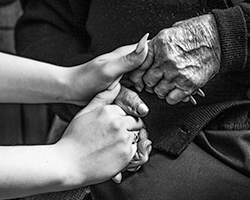 “Old story, new story…”
“Old story, new story…”
Softly, mournfully, Akiowa sang the Storyteller’s call to herself, but the rest died on her lips as she reached the brow of the ridge and gazed down over the land. A sparkling river ran alongside a birch forest, overlooked by a white rock shaped like a wolf howling at the sky. A rock she’d first seen as a babe, when her father had brought her to be blessed by the village totem. A rock which had watched, impassive, as the tribeless men carried her away.
Home. After the long years of slavery and wandering, she was home. She fell to her knees, one trembling hand at her mouth holding back her cry of joy, tears pricking her eyes.
Then joy turned to sorrow; the tears fell. For this was no longer home, since she was no longer Akiowa, young daughter of the tribe’s noblest man, his dwelling hers as long as she lived. She was the Storyteller, an old woman with no family, who would stay only a night or two before leaving.
 Akiowa sat with her back against a fir, looking out over the vast lake and its islands, occasionally brushing ants from her skirts, wishing she could push her thoughts away so easily. But the ants kept coming back as well, so perhaps there was no difference after all.
Akiowa sat with her back against a fir, looking out over the vast lake and its islands, occasionally brushing ants from her skirts, wishing she could push her thoughts away so easily. But the ants kept coming back as well, so perhaps there was no difference after all.
The spear had led her to so many villages, stirring so many painful memories of a lush valley – fruit trees, earth lodges, well-tilled fields. Memories of loving parents, a revered rock totem, an unhappy girl walking alone at dead of night. And beyond memory, the haunting vision of grief for a lost child. At each village her sorrow had grown. And guilt. So much guilt.
She’d never told the spear how she’d come to be enslaved, but perhaps it knew, and that was why it had brought her to this place, with its dark firs and thin soil and no people, where there was nothing to recall her reckless, inexcusable folly.
But no. There were people. A bull-boat came into view from behind an island, a woman paddling steadily towards the mainland away to Akiowa’s left.
The spear sent its thrill into her hand. “Must I?” she asked. The thrill came again. With a sigh she got to her feet.
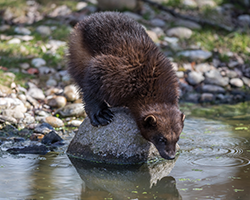 “Welcome, Storyteller,” said the woman, as laughing girls and young children danced around Akiowa. “I am Nadie. Forgive my man for not greeting you, but the menfolk are all out hunting.”
“Welcome, Storyteller,” said the woman, as laughing girls and young children danced around Akiowa. “I am Nadie. Forgive my man for not greeting you, but the menfolk are all out hunting.”
No, not all, for a boy of perhaps twelve years stood watching, a scowl on his face. His left leg was withered, wasted, and he leaned heavily on a stick.
“Siki, come meet the Storyteller,” called Nadie, but the boy turned away. “Take it not ill, Storyteller,” she continued quietly. “Sadly, my son thinks less of himself because of his leg. But come, be welcome at my home while we wait for the men.”
Baskets full of beads stood outside her lodge – stone, shell, coral, bone, turquoise – and after bringing spicebush tea and plum-bread for Akiowa, Nadie took up her work, stitching beads into strings. Another basket held finished necklaces and amulets. As Akiowa was admiring them – they were the finest she’d ever seen – the boy, Siki, appeared before her.
“My father,” he said, “is our greatest hunter.”
“And your mother is a wonderful beadworker. You can be proud of both.”
“And I’m a cripple,” he said defiantly, as if they’d argued over it. “I cannot hunt with him.”
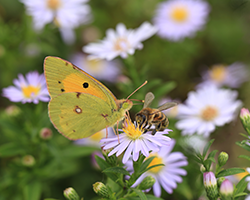 Akiowa stood gazing at the totem. Remembering. Grieving. It was blue-grey stone fashioned like an eagle, nothing like the white wolf of her clan, its festival decorations sprays of spring blossom not the colourful craftwork her people would have enjoyed making. Yet its spirit was the same, and memories of the last time she’d seen the white wolf rock threatened to overwhelm her.
Akiowa stood gazing at the totem. Remembering. Grieving. It was blue-grey stone fashioned like an eagle, nothing like the white wolf of her clan, its festival decorations sprays of spring blossom not the colourful craftwork her people would have enjoyed making. Yet its spirit was the same, and memories of the last time she’d seen the white wolf rock threatened to overwhelm her.
As though summoned by the memories, a young girl, her face creased with worry, hurriedly approached the totem. There similarity ended, for she touched the rock with hand and forehead, pushed something under the blossoms, then rushed away, all without noticing Akiowa.
Satisfying curiosity, Akiowa uncovered a scrap of painted rawhide, an eagle’s vivid essence soaring in brilliant colours. Wonderful work. But puzzling. Why had the girl left it there in such a strange manner?
#
Spring was ever a busy time – clearing, weeding, re-making the long mounds for the crops, burying rotten fish to improve the soil, planting seeds of maize, then beans and squash. Yet the women of Akiowa’s village still found time to talk or paint, while men boasted of old hunts and children played. Not here. Everyone worked, in fields which stretched as far as Akiowa could see. She wandered through the village, past mounds of thick-skinned squash – the mainstay of winter’s diet, but enough still remaining for the rest of the year – but no one noticed her until she gave the Storyteller’s call.
 As the echoes of the Storyteller’s call faded, excited laughter filled the air. Children rushed towards Akiowa, long-legged boys whooping as they ran, girls holding hands, toddlers waddling behind. Joy streamed from every child.
As the echoes of the Storyteller’s call faded, excited laughter filled the air. Children rushed towards Akiowa, long-legged boys whooping as they ran, girls holding hands, toddlers waddling behind. Joy streamed from every child.
No. Not every child.
A lone girl of perhaps ten summers caught Akiowa’s eye. Three times as she ran, she stumbled and fell. Children mocked her, adults expressed irritation, exasperation.
“Welcome, Storyteller!” called the headman. He led Akiowa to his home, gave her honeyed water to drink, and once the villagers had settled, the Storytelling began. And through it all, Akiowa wondered about the girl and the look of hatred on her face.
#
Eyes closed, head resting on a mossy root, arms wrapped about the spear, Akiowa sighed. The spear had rejected the comfort of the headman’s home with its new-woven sleeping mat, and had brought her into the woods to sleep. But sleep wouldn’t come.
All wasn’t well in the village. She’d sensed that as they’d gathered for the Storytelling – the squabbles, the sidelong looks – and the silence at the end confirmed it. Silence always followed a tale, as the spear’s magic still held everyone for a moment before the clamour of applause and calls for more. But the silence after her final story had been uneasy, brooding, lasting too long.
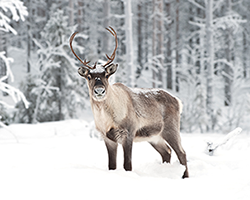 The spear again pushed her forward, but Akiowa held her ground behind a large pine. “No,” she said. “I don’t want to meet them.”
The spear again pushed her forward, but Akiowa held her ground behind a large pine. “No,” she said. “I don’t want to meet them.”
For some time, torn between curiosity and dismay, she’d been covertly watching the people bustling around on the far side of the frozen river.
Curiosity, for they were surely the nomads her father had once talked of – wanderers who followed their deer herds over the bleak, snow-buried land to which the spear had brought her. Everything about them was fascinating – their furs and colourful clothes, the tents they were dismantling, the pole devices for hauling baggage they’d strapped onto their large, strange-looking deer.
Dismay, because the people were obviously unhappy. Everyone’s expression was grim, children wailed, and by a lone juniper two old women sat apart, stone-faced, as if resigned to a terrible but unavoidable fate.
Dismay had won. Akiowa felt sad enough already – troubled by the unhappiness she’d met elsewhere, distressed at being unable to help, at not understanding how to help. She couldn’t bear the weight of more misery, more failure.
“Can’t you show me happiness?” she pleaded. The spear’s reply was to send its thrill into her mouth; the Storyteller’s call burst from her.
 “… and so despite all the hardships and the tricks of the envious, the Starlight Weaver and the White Moon Hunter joined hands at the first sunset of the beginning time. And ever after they have lit the night sky, for they wish us to remember their love and happiness, and to love and be happy ourselves. So ends this story.”
“… and so despite all the hardships and the tricks of the envious, the Starlight Weaver and the White Moon Hunter joined hands at the first sunset of the beginning time. And ever after they have lit the night sky, for they wish us to remember their love and happiness, and to love and be happy ourselves. So ends this story.”
Elation filled Akiowa. The conclusion of each of the ten very different stories she’d told the villagers had brought a glorious sense of fulfillment, though the telling of them was the spear’s work, not her own. But the tales of the Starlight Weaver had always been her favourite, told and retold by her mother and aunts, however imperfectly without the spear. And this particular story spoke to her now as never before.
Love was the answer to her searching. To find love was to find happiness.
But hard on the heels of elation came fatigue, for never had the spear crammed her mind and mouth with so many stories, one after the other. Yet the villagers were already calling out with more tales they wanted telling. She would have to continue.
The spear clearly disagreed, for it moved in her hand, pulling itself from the ground. “So ends this Storytelling,” it said through her. “For now,” she added, since the children sitting close by huffed and moaned with disappointment.
 Akiowa stopped well short of the village, expecting the spear to give her the Storyteller’s call, but it urged her further forward. She stopped again at the well-tended fields of beans and maize, then at the nearest dwelling. Still the spear pushed her on.
Akiowa stopped well short of the village, expecting the spear to give her the Storyteller’s call, but it urged her further forward. She stopped again at the well-tended fields of beans and maize, then at the nearest dwelling. Still the spear pushed her on.
The village seemed deserted save for sleeping dogs— no one weaving or making new bows, no children playing, no old folk gossiping in the evening shadows.
Then she found the villagers—fewer than she’d expected—standing before a staff of painted wood. Their totem, she guessed. But if this was a festival, where were the drums, the dancers? Arms outstretched, the villagers didn’t speak, didn’t move. Yet whatever else was missing, joy was clearly present—it shone on their rapt faces.
A strong, warm voice sounded: “Thank you, Earthmaker.”
As the villagers let their arms drop, the spear sent its thrill into Akiowa. She gave the Storyteller’s call.
People started in surprise, but save for a few excited children, who were rapidly called back, no one moved until a tall, handsome man stepped out. Not the headman, for that was surely the old man dressed in lionskins standing behind him. The shaman? But he wore no spirit necklace, and would even a shaman dare take the headman’s place in welcoming her?
“Greetings, Storyteller,” said the man. “I am Pawau, priest to the Believers. We are close to completing our worship. Join us, then we shall eat together and end the day with your stories.”
 Akiowa gave a sigh, part relief, part longing.
Akiowa gave a sigh, part relief, part longing.
The spear had kept her in the mountains since leaving the miners, and she’d yearned to see – and walk on – something more pleasurable than deep snow and bare rock. Now at last she was overlooking a lush valley full of chokecherry, black plum and mulberry trees, much like the lands of her own tribe.
There, also, a village like her own: a scattering of earth lodges and rows of squash and beans. Some women worked – tending cooking pots, grinding grain – but most villagers sat in groups, talking. Laughter reached her.
Wistfulness enveloped Akiowa. How contented they looked. How happy. But then, the miners had seemed happy.
“Have they found happiness?” she whispered.
The spear gave no answer, but guided her down towards the village. Her heart lifted as she walked through woods glowing with autumn tints, though dismay grew at the lack of fruit on the trees – even the bitter chokecherries were stripped bare. Fruits were valuable food, but were far more valuable to the birds and beasts who shared the land. Only at a time of great need would her mother have allowed all to be picked.
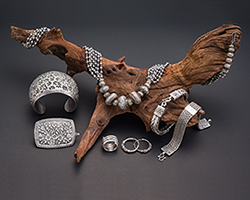 At last! Akiowa had lost track of how long she’d been walking towards the mountains, though awe at their magnificence had long since faded into acceptance. But here were the foothills, and the spear was guiding her towards a great cleft in the rock. Excitement claimed her. The silver miners’ camp had to be close.
At last! Akiowa had lost track of how long she’d been walking towards the mountains, though awe at their magnificence had long since faded into acceptance. But here were the foothills, and the spear was guiding her towards a great cleft in the rock. Excitement claimed her. The silver miners’ camp had to be close.
Since leaving the old man and his wretched independence, the spear had kept her away from villages, and she’d met only a few hunters and a family who were resting alongside their canoes on their journey down a wild river. The spear had given her stories for them, and in return they’d shared food and tales of the miners’ wealth. “If only we were rich,” a child had sighed. “How happy we’d be.”
Of course! Happiness would be found with riches. Akiowa had hugged herself when the spear agreed to take her to the miners, and now she was nearly there.
Akiowa skirted a towering boulder of rock, then stopped in surprise and alarm. Several hundred paces ahead, stretching across the cleft, an enormous wooden barrier rose out of the rocky ground, each thick stake a giant fir. Dismayed at the outlandish sight, she didn’t notice the men watching from the top of the barrier, bows drawn, until one shouted.
“What’s your business?”
Fear constricted her throat, but the spear sent its thrill up her arm, invoking the Storyteller’s hail. “Old story, new story,” she cried, her weak, wavering tones transformed to a clarion call. “Tall story, true story.”